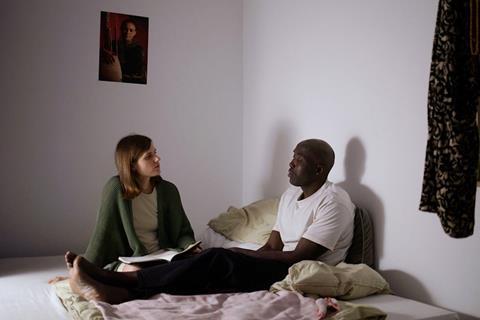Ivette Löcker follows an Austrian woman and a Gambian man as they navigate their relationship

Dir: Ivette Löcker. Austria. 2025. 105mins.
Living between two worlds also means meeting one another halfway in Austrian filmmaker Ivette Löcker’s latest documentary. Taking a measured approach, Löcker follows the interracial relationship between Gambian man Siaka Touray and his Austrian wife Victoria Preuer over the course of about a year, as they forge their lives together in Vienna. The shooting style also offers a partnership – between observational moments from their daily interactions and more formal interviews, in which they express their feelings directly to the camera, both separately and together.
Löcker gives the couple space to articulate the differences between them
The intimate approach in Our Time Will Come is in keeping with Löcker’s previous documentaries, including If It Blinds, Open Your Eyes (2014) and Ties That Bind (2017). Its low-key nature may be a little understated for some audiences, but the film’s recent win in Sarajevo’s documentary competition, following its world premiere in Berlin’s Forum section earlier this year, should help it attract further attention on the festival circuit and on home turf.
The relationship between Victoria and Siaka has been marked by precariousness since they first got together, when his residency status was in doubt. In addition to the bureaucratic hurdles, Siaka offers first-person testimony concerning the “sickness” of racism. Victoria and Siaka’s families welcome them with open arms, but it is notable how open-hearted Siaka’s community is to Victoria when the couple travel to Gambia – a marked contrast to Siaka’s encounters in white-dominated Vienna. He recalls being set upon there by two men in a racially motivated attack, adding that the police who arrived then treated him like the criminal. “It’s like every Black man in Europe is an animal,” he says.
The fear they experienced over the uncertainty surrounding Siaka’s settled status is brought into focus as the pair sit together while Victoria reads diary entries from the period before he acquired all his papers. “I wanted my normal life back,” she says, later adding, “Actually, I never wanted a normal life” – opposing sentiments that encapsulate the tensions surrounding the conventional existence the couple are striving for.
Löcker’s film is unusual in that it focuses on this construction of a ‘normal’ life rather than the sort of obvious dramatic arc sought by many documentarians. While there are still challenges, not least in terms of Siaka’s employment, the pair are navigating many of the ins and outs of modern life that any couple faces – cooking together, helping to clear a shared garden space, working out where to hang pictures, making plans to start a family.
Löcker gives the couple space to articulate the differences between them, in terms of personality traits, cultural experiences and expectations. Even the documentary itself is interrogated during one extended interview, when Victoria says she is concerned there is not enough joy in the film, while Siaka argues about the importance of expressing the pain that has been experienced for others to see. Löcker does not hide the fact she steps in here, almost in the role of mediator.
It is striking that Victoria and Siaka are open about expressing their different attitudes to life. In general the couple are not afraid to communicate their views to one another but they are always looking for neutral ground, even in terms of the language they use, with both speaking English – a second tongue for each of them. Löcker’s quiet and unassuming approach allows the documentarian to show the gap between Victoria and Siaka is less important than the bridges they are determined to build across it.
Production companies: KGP Filmproduktion
International sales: sixpackfilm, office@sixpackfilm.com
Producers: Barbara Pichler, Gabriele Kranzelbinder
Cinematography: Frank Amann
Editing: Esther Fischer
























